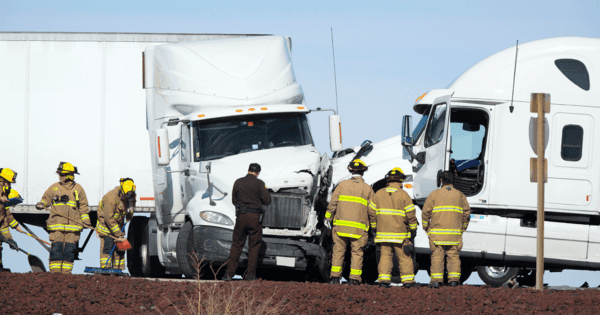How has COVID-19 affected US logistics and trucking, and what does it mean for the future? Here we discuss some thoughts and views shared in a recent OCO Broadcast. In the webcast, Gareth Hagan, Commercial Director of International Trade specialist OCO Global spoke to Kevin J. Traver, Chief Commercial Officer of the American Trucking Associations (ATA) and Michael Kiely, Senior Vice President of U.S. Government Affairs for UPS.
The COVID-19 pandemic has impacted every area of life right across the world. People have had to change how they live – both work and leisure. Businesses have transformed how they operate. The logistics industry is no different and has been at the forefront of responding to the situation. Truckers will also be pivotal as the country returns to some kind of new ‘normal’.
Logistics and Truckers are the lifeblood of the US
Kevin Traver believes that the COVID-19 pandemic has brought the Trucking and Logistics sector into the forefront of the public’s minds. The 3.5 million truck drivers in the US are the backbone of the country, he says, and the crisis highlights how crucial truckers are to so many industries and sectors – now, more than ever. Truckers deliver PPE to hospitals, food and supplies to stores, testing kits to places they’re needed. Indeed, 79% of freight moved around each day in the US is moved by truck.
The crisis has meant that Americans are starting to understand what ‘essential’ really means – and this includes truckers and logistics professionals. As Kevin puts it: “When trucking stops, America stops.”
The Logistics Sector has changed during COVID-19
UPS, and other logistics providers, have made rapid and far-reaching changes to their operations. These are based on market demand. Historically, most of UPS’s business has been Business to Business (B2B). However, almost overnight this changed thanks to a pandemic that kept people at home.
If people are at home and aren’t able (or allowed) to go out, how they need to receive goods changes, hence e-commerce has exploded during the pandemic. This isn’t just for the global giants – Michael talks about millions of small businesses taking their operations online and says that any business can be a global business. Online businesses can expect to retain a lot of market share over the next few years; people want their stuff and therefore all these businesses need shipping.
That change is permanent
Michael and Kevin agree that this shift to residential deliveries is here to stay. It was already happening, but things have shifted very fast thanks to COVID-19. People want everything from groceries to luxuries delivered to their doorsteps in 1-2 days.
The logistics sector has had to rapidly adjust to meet this changing demand. UPS has adjusted its network. Michael freely admits this has been a challenge at times, but he believes they are winning the battle.
Whilst there will always be a global logistics market, we can expect a continued shift towards a more regional logistics model with fewer long-haul truckers and more local distribution centers. Already average daily miles driven by US truckers have reduced – from 800 in the year 2000 to 505 in 2019. Business models are changing and companies like UPS are adjusting fast.
Technology is the future of logistics
If logistics is the future, how will technology develop the sector? The trucking industry is driven by a culture of safety and technology which is gathering pace.
Kevin talks about CameraMatics bringing safety technology to the US logistics and trucking industry, that wasn’t available to them before. UPS is investing heavily in technology, focusing on end consumers, not just businesses – in line with the shift to B2C as well as B2B business.
UPS is committed to maximising safety technology in its trucks. This is partly a recruitment tool to attract more drivers into the industry by making it safer. With human error contributing to 91% of accidents and fatalities on US roads, truck safety technology like CameraMatics has the potential to save tens of thousands of lives.
Michael and Kevin agree the whole range of driver-assist (not driverless) technology holds enormous potential for the logistics industry. Technology can – and will – dramatically reduce accidents and fatalities as well as cut congestion, reduce emissions, and improve efficiency.
At this time of uncertainty, one thing is for sure: logistics and trucking are at the center of the future of life not just for businesses, but for consumers too.
Listen online to the full OCO Broadcast on The Future of Logistics in the US.







